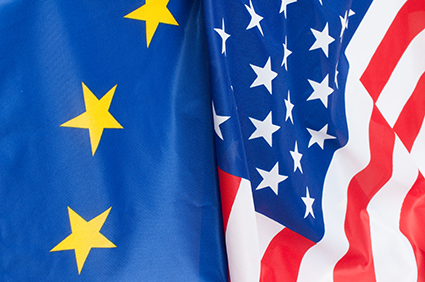28 September 2021
The TransAtlantic Consumer Dialogue welcomes renewed EU-U.S. voluntary cooperation but warns of the consequences of lack of transparency and engagement.As the European Union and the United States hold the first meeting of their Trade and Technology Council (TTC) this week, issues of high importance to all U.S. and EU residents are on the table, such as artificial intelligence, online platform power, Internet of Things and other digital rights challenges including those spotlighted by the COVID-19 pandemic and climate issues.
This process is the first major cooperation between the two since the failed Trans-Atlantic Trade and Investment Partnership (TTIP) negotiations and involves a series of dialogues on regulatory topics.
The Transatlantic Consumer Dialogue (TACD) has long advocated for voluntary exchanges between U.S. and EU regulators, providing such dialogues are fully transparent, involve all stakeholders and could lead to shared best practices, less dangerous products on the market, or higher privacy protections for all.
While the EU has made positive strides in terms of transparency in its dealings with the U.S., including an update on the TTC in mid-September, the same cannot be stated of the U.S. side which continues to operate a closed-doors policy, including for the forthcoming so-called stakeholder event this week. TACD members strongly condemn this lack of inclusiveness and call on the U.S. administration to change its approach.
TACD members commented:
“The EU and U.S. discussions should in no way give the U.S. influence over how the EU regulates important consumer topics, which is why transparency is indispensable. We urge both the EU and U.S. to focus on practical communication to the public, such as setting up a website with meeting reports and hosting regular briefings that allow civil society to scrutinise what is being discussed.” Monique Goyens, Director General of BEUC – The European Consumer Organisation, and European co-chair of the Transatlantic Consumer Dialogue
“Consumer and digital rights organisations in the EU and the U.S. recommend that the discussions within the Trade and Technology Council aim at better protecting consumers. They should recognize that digital governance and regulation that protect individual rights and the public interest are not trade barriers and must not be constrained as obstacles to trade.” Edmund Mierzwinski, Senior Director, Federal Consumer Programs at U.S. PIRG, and U.S. co-chair of the Transatlantic Consumer Dialogue
“Digital technologies and platforms, regardless of where they are designed and deployed, must not undermine people’s safety and freedom of expression. Legislation should remain the avenue of choice to rein in the power of Big Tech. The Trade and Technology Council should not provide a platform for business groups to influence the EU’s ongoing regulatory processes on AI and platform regulation through the backdoor. Our rights are not up for trade.” Claire Fernandez, Executive Director of European Digital Rights (EDRi)
“Governments on both sides of the Atlantic have experienced damaging political and policy fallout from decades of corporate-rigged “trade” policies, so hopefully this dialogue will launch a new worker and consumer-protection centred approach that ends the EU’s blockage of the waiver of WTO intellectual property barriers now thwarting production of sufficient COVID-19 vaccines to end the pandemic, and ends the U.S. attack on the EU’s public interest digital governance rules, anti-monopoly initiatives and strong food safety and chemical safety policies. But the lack of transparency about the process and lack of U.S. government consultation with any consumer or non-business interests could result in this process pushing the same corporate agenda that doomed the U.S.-EU trade talks.” Lori Wallach, Director of Public Citizen’s Global Trade Watch
“Increasingly the digital economy is characterised by a few companies in dominant positions. Because of their dominance, these companies collect and analyse vast amounts of data. The more data they collect, the better they become at profiling consumers and using those profiles to improve the attractiveness of their own services. And the more people are drawn into these services, the less they can opt out of their data exploitation strategies. The Trade and Tech Council should support efforts to break this vicious cycle and create the conditions for effective competition, which is necessary for privacy and innovation.” Tomaso Falchetta, Global Policy Lead at Privacy International, and member of TACD’s Steering Committee
“Digital technologies are transforming every aspect of the food system, from seeds to fields to the distribution and consumption of food. Governments must ensure a transparent and consultative process that engages all affected sectors, from farm workers to consumers. There are important commercial interests at stake, but even more pressing are the public concerns with unsustainable food systems that encourage waste and low-quality food and contribute to the climate crisis.” Sophia Murphy, Executive Director, Institute for Agriculture and Trade Policy
Background:
TACD and its members on both sides of the Atlantic will closely monitor the EU-U.S. talks. The Dialogue issued in June 2021, six demands for a new EU-U.S. cooperation agenda to:
- Be fully transparent and meaningfully involve civil society
- Deliver to consumers
- Ensure access to affordable medicines for all
- Be ambitious on sustainability
- Protect consumers in the digital sphere
ENDS
Contact:
Oriana Henry, TACD Coordinator, oriana.henry@tacd.org
